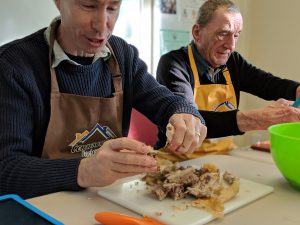Community Involvement Volunteering
Become an Environment Action Volunteer

We are currently recruiting for new Environment Action Volunteers (including Master Composters) in Leicestershire. We welcome diversity and invite applications from people from a wide range of backgrounds. No previous experience of volunteering is necessary and full training will be given.
We are currently accepting applications to join the Environment Action Volunteer (EAV) scheme from:
- Leicestershire residents (this excludes residents of Leicester City and Rutland owing to the way the EAV scheme is funded)
- People aged 18 years or over (for insurance purposes)
- People with an interest in helping Leicestershire residents / communities to reduce waste, recycle more, protect and improve the environment and to live more sustainably
- You are free to attend one of our upcoming training sessions, see dates below
You do not need to have any prior knowledge of waste or environmental topics to apply, although having an interest would be beneficial.
All our EAVs are covered by appropriate insurance. Approved expenses including travel and mileage costs incurred in performing the voluntary role are reimbursed.
Apply to become an Environment Action Volunteer
Upcoming training dates
We’re not actively recruiting for new EAVs currently, but plan to do so later in 2025 with a view to running training sessions in September.
We welcome applications in the meantime, but please be aware that there may be a period of waiting prior receiving training / before you can begin volunteering.
However, if we receive sufficent interest from applicants prior to September, we will aim to run training courses sooner.
Also in Community Involvement Sub menu
Environment Action Volunteers (EAVs ) encourage and support people in Leicestershire to take action to reduce their impact on the environment. The scheme is managed by Leicestershire County Council’s Environment, Carbon Reduction and Waste Initiatives teams.
Examples of the types of activities Environment Action Volunteers get involved with include:
Raising awareness, giving advice and providing education
- Attending events and talking to people about topics such as food waste prevention, home composting, waste reduction, reuse and recycling, the use of reusable nappies, carbon footprints, climate change and biodiversity
- Supporting social media campaigns, initiatives and events designed to help people in Leicestershire to live more sustainably and less wastefully. For examples of current social media campaigns see here
- Delivering talks, presentations and workshops for community groups and educational establishments on topics related to waste, the environment and climate change
Providing practical support
- Supporting community fridges, community kitchens or other projects that make good use of surplus food that would otherwise go to waste
- Supporting parish councils to be more aware of and take practical actions to protect biodiversity
- Running cooking classes and teaching people to buy, prepare, cook and store food with minimal waste
- Helping to promote and support our reusable nappy initiative, helping the parents and carers of young children to make the change from single use disposable nappies to reusable alternatives
- Supporting community groups to tackle climate change
- Establishing compost demonstration sites where people can visit and learn about home composting, the different types of bins and composting techniques available, and where people can get involved with community composting
- Contributing materials for publication via a range of media including print, social media, video and radio. For examples see here
- Developing projects to demonstrate environmental good practice and show community leadership
- Providing informal advice to friends, family and neighbours on a range of topics relating to waste, environment and climate change
- Helping to establish community events where people can swap, swish or donate unwanted items
- Supporting or developing projects that encourage Leicestershire residents to live more sustainable lifestyles
- Helping to establish or run community events where people can learn to complete maintenance or basic repairs to broken items that might otherwise go to waste
- Helping to establish and run sharing schemes in Leicestershire such as tool libraries or book swaps
- Events planing and on-the-day support
- Running or supporting E-Bike / Cycle courses – planning and on-the-day support
- Ad hoc activities in support of our campaigns

Volunteers supporting the delivery of zero waste cooking classes at a community kitchen
The Environment Action Volunteer selection process and training
If your application is successful, you’ll be invited to an informal meeting with a scheme coordinator. These meetings may be individual or as part of a group depending upon your availability. The purpose of the meeting is to provide you with an overview of the scheme and its aims, and to give you the opportunity to ask any questions that you might have. You may also have chance to meet some of the people you’ll be volunteering with.
During the meeting the coordinator will discuss with you what you hope to achieve while volunteering, what sort of training and support you’ll need in order to meet your aims, how much time you wish to commit to the Environment Action Volunteer scheme, when and where you might be available to volunteer and what qualities and experiences you might be able to draw upon in support of your activities.
If after the meeting you and the scheme coordinator decide that the Environment Action Volunteer scheme is right for you, you’ll be invited to participate in the following training sessions:
- Mandatory training – covering Health & Safety, Data Protection and other topics so you can perform your role safely and to a good standard.
- Basic training – giving you an overview and basic level of understanding of all the topics covered by the EAV scheme.
- Specialist training – giving you a foundation to develop an expertise in a chosen field of interest.
You can begin volunteering after completing your mandatory and basic training, but we will encourage you to choose a specialism to become a fully-fledged Environment Action Volunteer.
Specialist topics include:
- Garden Organic Master Composter training – You’ll learn about all things composting. Topics include how the process works, microorganisms, what you can and can’t put in a compost bin, the different types of compost bins available and how you should use your compost
- Love Food Hate Waste adviser training – You’ll learn about the financial, social and environmental impact of food waste, why food waste happens in the home, and a range of strategies to help people reduce it
- Food waste prevention cooking classes / demonstration training (includes a Level 2 food hygiene qualification) – You’ll learn how to organise and run cooking classes teaching people to buy, prepare, cook and store food with minimal waste. Your classes will be funded so you can run them at no cost to yourself or the people attending
- Reusable nappy adviser training – You’ll learn about the impact of disposables and the advantages of using reusable ; the types of reusable nappies available and how to use them.
- Recycling and contamination training – The training covers in depth knowledge of the recycling system, what’s accepted in the kerbside recycling and how to present these items, contamination and the problems it causes, and engagement tools available for volunteers to use
- Biodiversity and Nature – Volunteers will have the opportunity to pick specialist nature / environment modules tailored to their interests that directly relate to LCC Environmental Initiatives. Projects include the urban verge wildlife scheme, dedicated to helping re-wild and survey some of the county’s roadside verges for nature, as well as opportunities to promote the planting and restoration of local woodlands and orchards, along with the survey and monitoring techniques for controlling and reporting invasive and non-native species (INNs). These roles are crucial in supporting local awareness through local education on biodiversity. Training will be supported through an AQA Unit Award Scheme
- Wear, Care and Repair advisor – You’ll learn about the impacts of textile production and the importance of keeping textiles in use for as long as possible; tips for residents to care for and repair them and guidance on what to do when they no longer want them.
- Environment and Carbon awareness – details TBC
The exact content of your specialist training will vary depending upon the type of volunteering you want to undertake (for example, we won’t train you how to run a cooking class if you don’t want to run cooking classes) and the skills and experience that you bring to the role.
Being an Environment Action Volunteer
Once training is complete Environment Action Volunteers can choose when, where and how they volunteer, although we do suggest that a minimum of 30 hours’ volunteering are completed within 12 months of completing your mandatory training. This is so that you have opportunity to practice and consolidate what you have learnt . Scheme co-coordinators will communicate volunteering opportunities to appropriately qualified volunteers by email. Volunteers are also expected to take a degree of responsibility for generating opportunities themselves. Environment Action Volunteers are expected to actively engage other people with appropriate messages and resources whenever opportunities arise. For example, this could entail approaching a local school and offering to do an assembly, organising to run a stall at a local event, writing an article for a local newsletter, posting something on social media, or simply chatting to a neighbour about their recycling.
Each month you’ll be asked to feed-back your activities to a scheme coordinator. The information you provide will be added to your personal volunteering log. Information from all Environment Action Volunteer logs is collated periodically and used to help measure the impact that the scheme is having in Leicestershire.










